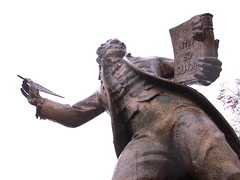Paine identifies three things that are used as means of deception: Mystery,
 Image by --Tico-- via Flickr
Image by --Tico-- via FlickrMiracles, though, that he spends some time on. I loved his discussion of miracles, not only because of the devastating fusillade that he levels against the notion, but because it exposes an aspect of belief in miracles I had never really considered before: the incredible arrogance it betrays.
His main attack on the idea of miracles is that the whole idea is presaged on knowing what is possible and what is not:
Mankind have conceived to themselves certain laws, by which what they call nature is supposed to act; and that a miracle is something contrary to the operation and effect of those laws. But unless we know the whole extent of those laws, and of what are commonly called the powers of nature, we are not able to judge whether any thing that may appear to us wonderful or miraculous, be within, or be beyond, or be contrary to, her natural power of acting.
Essentially, we don't know all the laws of nature, and unless we do, it is premature to declare an event as being beyond their power, not to mention a bit presumptuous. Paine goes on illustrate with example (how a man floating high in the air would've seemed "miraculous" to people, but then balloons were invented) and then moves on to the second objection, namely Art: it is possible to create the appearance of a thing. He notes a performance in Paris wherein "ghosts" were shown, not to bamboozle, but for entertainment. The effect, he says, was quite astonishing. So, you have to not only know the full extent of natural law, but you have to know how far Art can go in creating illusion, before you can make a claim that something is a miracle.
It really strikes me, mulling over his argument, the arrogance that belief in miracles entails. To claim such knowledge! To claim to know what exactly is possible and impossible, not only in nature, but in art! What amazes me, over two centuries later, is that people still make that kind of claim. Science has been sitting us on our asses again and again. At each stage we find new marvels, new things we didn't even know could exist, and we also learn about whole new realms of knowledge in which we are ignorant. And Art? Could the performers of Paine's day even dream of the kinds of illusion that are created in today's movies, or that magicians like Penn and Teller perform in Vegas?
And they call rationalists arrogant. Hah!
Coming up soon: Prophecy, and the other line of attack that Paine uses on Miracles. Or, why Paine, as a believer in God, is really a bit perturbed the very notion.
![Reblog this post [with Zemanta]](http://img.zemanta.com/reblog_e.png?x-id=4be2bf0e-9cf6-4c43-afc6-bd4c9524f535)



